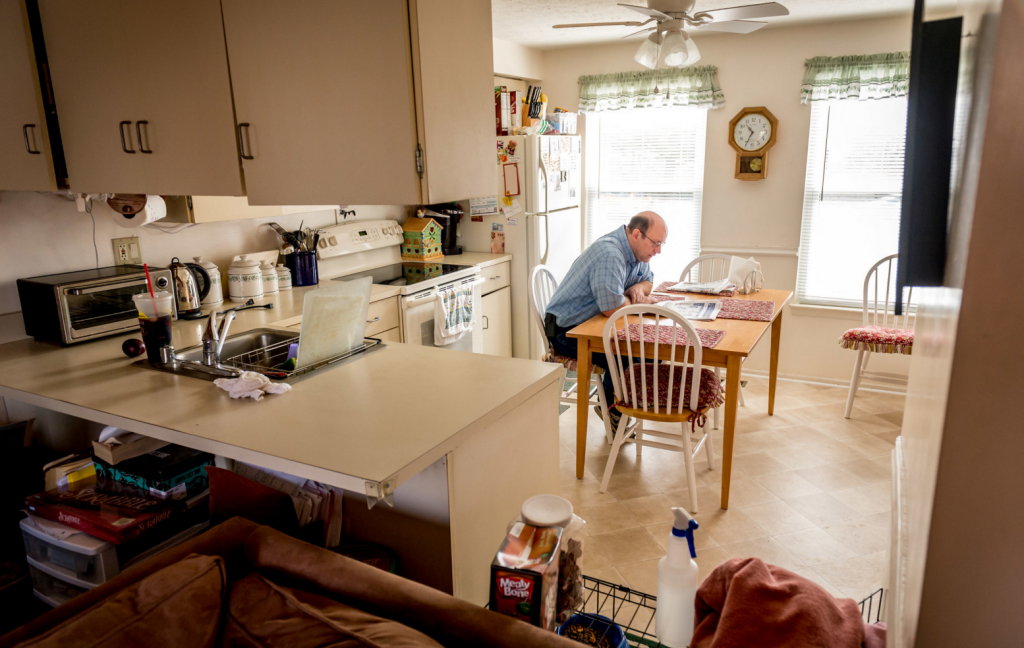
We’ve made it to the tenth installment of author Ted Scofield’s series on everybody else’s biggest problem but your own. If you missed one or more of the previous installments, you can find them here. New installments will be posted every two weeks, on Tuesdays.

On a quest for a generally applicable definition of greed, we’re working our way through nine common attributes or factors frequently raised in the discussion, and today we’ve reached our penultimate concept, best articulated by a Mockingbird conference participant last April: “You are greedy if you want, take, or have more than you’ve earned.”
It’s a comfortably logical proposition, isn’t it? If I earn my money (and the stuff money buys), then I’m not greedy. But if I have stuff that I did not earn, if I live off the labor of others, well, then ….
***
In large part due to the populist boogeymen we examined last time, typically it’s the left wing of the political spectrum that gets both the most attention and the most mileage out of the greed issue, but today, with this attribute, earned, the right wing gets its chance.
Why? Almost always, when folks on the left talk about earned, they have in mind middle-aged white guy “fat cats” who are paid millions of dollars, whether they be corporate executives, Wall Streeters or trial lawyers.
But as we concluded when we diligently dissected abundance and vocation, we are fundamentally unable to define greed in terms of how much some people are paid to do their jobs. Consensus is impossible. “Greed” eludes.
So today we’ll look at the flipside of the anti-fat-cat stridency, at the right wing’s aversion to the “welfare culture” and those people who take money they (allegedly) did not earn.

First, let’s set the stage. Recall the 2015 Pew Poll which showed 44% of all Americans, and 71% of Republicans, believe “government aid to the poor does more harm than good.” Pundit and author Bill O’Reilly added a racial component to the plurality’s polarizing position in 2014:
I agree that the welfare culture and the pandering and the condescension by the white establishment to poor blacks has harmed them economically.
How does this “welfare culture” harm the poor? The argument goes like this: Offering unearned money and benefits to people provides them with a perverse incentive to choose not to work, to live off the labor of others, increasing taxes and spending and debt and substance abuse and crime and every other societal ill known to Fox News commentators. If today’s notion of earned is indeed dispositive, welfare enables and encourages greed.
No surprise, our media happily provide us with sensational stories, grist for the reactionary mill. A few headlines:
- Lottery winner on food stamps even after $1 million jackpot
- Landlord got food stamps while raking in $83,000 in rent
- Seattle welfare recipient lives in million-dollar home
Turns out the Seattle woman’s lakefront home, valued at $1.2 million, has a boat dock. For over nine years she accepted “more than $1,200 a month in public housing vouchers, plus state and government disability checks and food stamps.” She and her husband traveled frequently to Turkey, Israel and resorts in Mexico.
 But, many of us say, these are egregious examples of obvious criminal fraud, not evidence of an incentive perverting “normal” people in need, and that is certainly accurate. Unfortunately, quite a bit of disconcerting data add a far more substantive layer to the political hotcake, and to our discussion of greed.
But, many of us say, these are egregious examples of obvious criminal fraud, not evidence of an incentive perverting “normal” people in need, and that is certainly accurate. Unfortunately, quite a bit of disconcerting data add a far more substantive layer to the political hotcake, and to our discussion of greed.
On December 12, 2014, a New York Times front-page article, headlined “The Vanishing Male Worker, Waiting It Out,” reported on a NYT/CBS poll of unemployed American adults.
The poll found that, despite enduring numerous ill-effects of unemployment, many jobless men “are choosing not to work”; specifically, “44 percent of men in the survey said there were jobs in their area they could get but were not willing to take.” One respondent receiving federal benefits said he might have to soon dip into his savings, “or I guess I go find me a job washing dishes … I haven’t gotten that low yet.”
How and why are 44% of unemployed men choosing not to work? Economist Larry Summers served as President Obama’s Director of the National Economic Council and is the President Emeritus of Harvard University. His study, and a host of others, provides the science behind the Times’ poll results and tales of woe.
Summers writes that “government assistance programs” provide jobless people “with an incentive, and the means, not to work.” Summers’ detailed case study boils down to this: A man loses his job earning $15 an hour. He collects $8.25 an hour in unemployment benefits. After taxes, the difference between a new job paying $15/hour and the benefits is $4.39 per hour. “Comparing the two payments,” Summers states, “this person may decide that an hour of leisure is worth more than the extra $4.39 a replacement job would pay.” End result: The person chooses not to work; he is part of The New York Times’ 44%.
Numerous studies over three decades confirm Summers’ conclusions, that unemployment benefits raise a person’s reservation wage – “the minimum wage he or she insists on getting before accepting a job” – and, consequently, that benefits “cause an unemployed person to remain unemployed longer.”

Some corroborating findings from a variety of studies include:
- “… a $1 increase in benefits may raise pre-tax reservation wages by as much as $0.44 … evidence of the moral-hazard cost of raising unemployment benefits.”
- “… across the 50 states and D.C., job search is inversely related to the generosity of unemployment benefits…”
- “… job search intensity for those eligible for Unemployment Insurance (UI) increases prior to benefit exhaustion…”
- “… UI benefits are found to have a strong negative effect on the probability of leaving unemployment … however the probability rises dramatically just prior to when benefits lapse.”
Charles Sykes, author of the 2012 book A Nation of Moochers, sums up the science in terms easier to understand:
Economists confirm what common sense suggests: When you can pocket 50 to 60 percent or more of your salary for doing absolutely nothing, many workers will prefer sitting on the couch to returning to work. Moreover, extending the benefits tends to extend the time on the couch, while the expiration of the payments (not surprisingly) turns out to be a motivating factor in getting workers back to work.
The Wall Street Journal provides us with a real-world example, reporting on a management recruiting company that had a tough time filling six engineering positions in Oregon. A partner at the firm told the Journal the annual salary of $60,000 wasn’t enough, according to many unemployed candidates. In fact, “some candidates suggested he call them back when their benefits were scheduled to run out.” Summers would say those not interested in the job had a reservation wage higher than $60K and, thanks to government assistance programs, they had the means to choose not to work.
“In other words,” Sykes writes, “the jobless behave rationally. They will take the benefit as long as they can and only start seriously looking to go back to work when it runs out.”
No surprise, politicians on both sides of the Atlantic have taken notice of the economic consensus. In the United Kingdom, as reported in The Guardian, unemployed Brits who refuse to accept a job offer can lose their benefits, as can people who fail to “actively” seek out employment.
“Choosing a life on benefits when you’re able to work is not an option,” declared Mark Hoban, the employment minister when the “tough rules” were enacted in 2012.
 In a further attempt to “end the welfare culture,” in August 2015 The Independent reported on a new initiative requiring jobless young people to sign up for a three-week intensive program practicing job applications and interview techniques “within a month of claiming benefits – or see those benefits stopped.” Larry Summers might say that the prospect of sitting in a sterile classroom for three weeks, instead of on the couch, lowers a person’s reservation wage.
In a further attempt to “end the welfare culture,” in August 2015 The Independent reported on a new initiative requiring jobless young people to sign up for a three-week intensive program practicing job applications and interview techniques “within a month of claiming benefits – or see those benefits stopped.” Larry Summers might say that the prospect of sitting in a sterile classroom for three weeks, instead of on the couch, lowers a person’s reservation wage.
Here in the States, two months ago we read “a Maine mayor is proposing a controversial name-and-shame strategy for welfare recipients, saying he plans to push a bill requiring the state to publish the names and addresses and other details for ‘every individual on the dole.’” Noting that state employee compensation and pensions are already reported, the mayor argued “the public has a right to know how its money is being spent.”
Naming and shaming people on the public dole. If you bet the mayor is a Republican, you win. His political opponent’s response was equally predictable: “Resorting to publicly shaming poor people is a sad, desperate act.”
Let us digress for a moment to ponder an interesting question. If it is indeed “sad and desperate” to name and shame poor people, or if it isn’t, does the same conclusion apply to the rich? In his 2014 book Greed, British philosopher Stewart Sutherland proposes “naming and shaming … perhaps making all tax returns, individual and corporate, a matter of public record … would be a good starting point.”
Professor Julian Edney, in his 2005 book Greed, reminds us of the British tradition of giving a white feather to young men who refused to volunteer for wartime military service. He writes “greed and cowardice are both considered moral vices, and the idea is to give a white feather to instances of conspicuous greed.”
Can we – should we – shame a jobless person into getting off the couch and finding work? Can we – should we – shame a wealthy person into spending less on herself and donating more money to charitable causes?
I imagine our answers to these questions rely on our perception of greed. If one or both of the hypothetical duo are greedy, perhaps they should be publicly embarrassed into changing their behaviors. Or maybe not?
Renewing our focus on today’s topic, can we collectively agree on a definition of greed based in whole or in part on how a segment of society perceives the “unearned” money another segment receives (either from taxpayers or a clubby board of investors)? The question answers itself. No.
I suggest the issue transcends ideology and, if earned implicates the left wing of the political spectrum, it equally implicates not only the right but all of us.
After all, why must the jobless and disabled and elderly rely on taxpayers in the first place? Why is our government in the “welfare” business? Looking in the mirror, when did I last personally take responsibility for someone in need, provide them with money for rent, or a bag of groceries, or something more than a quarter in a tattered sidewalk coffee cup? When did you?
Right, left, middle – we all abdicate our responsibility to government to help the unemployed. Do we then have the right to complain about the fruits of our abdication? Can the right complain that the poor take too much money they have not earned? Can the left complain the rich don’t pay enough and demand more tax money from those who have earned?
Certainly it is easier for a person in need to accept unearned money from faceless taxpayers than from friends, family or neighbors. With taxpayer money, the sacrifice is far too removed from the recipient. The benefit is functionally anonymous, free money without consequence, and “the jobless behave rationally” for as long as the government allows.
But, returning to Larry Summers’ example, what if the unemployed young man was getting his $8.25 an hour benefit from his sister instead of the taxpayers? What if he knew the source of the gift, understood the sacrifice involved? Would he reject the $15/hour job offer, preferring an hour of leisure over the $4.89? My guess is if he even considered staying on the sofa, his sister would have something to say to change his mind. She wouldn’t talk moral hazard, and she wouldn’t need a white feather.
My point here is not to slander welfare recipients, nor am I condemning taxpayers as selfish abdicators. The earned issue, as it relates to greed, transcends government benefits and CEO salaries and all the other issues on which we will never form a consensus. And it should touch all of us, regardless of our economic position in life.
I’ll close with the wisdom of the multi-talented Robert James Ritchie:

COMMENTS
One response to “Everybody Else’s Biggest Problem, Pt. 10: The Perverse Incentive”
Leave a Reply













Here’s a middle-of-the-road idea: With every unemployment benefits check, with every food stamps payment, let’s include a photo of a middle class American taxpayer and a note: “Please take a moment to thank the taxpayers for this generous gift.” It’s not public shaming, but it would hopefully get across the message of personal sacrifice.
Humans are just too selfish to help others. We must be forced to do so by taxation.
Great post once again!